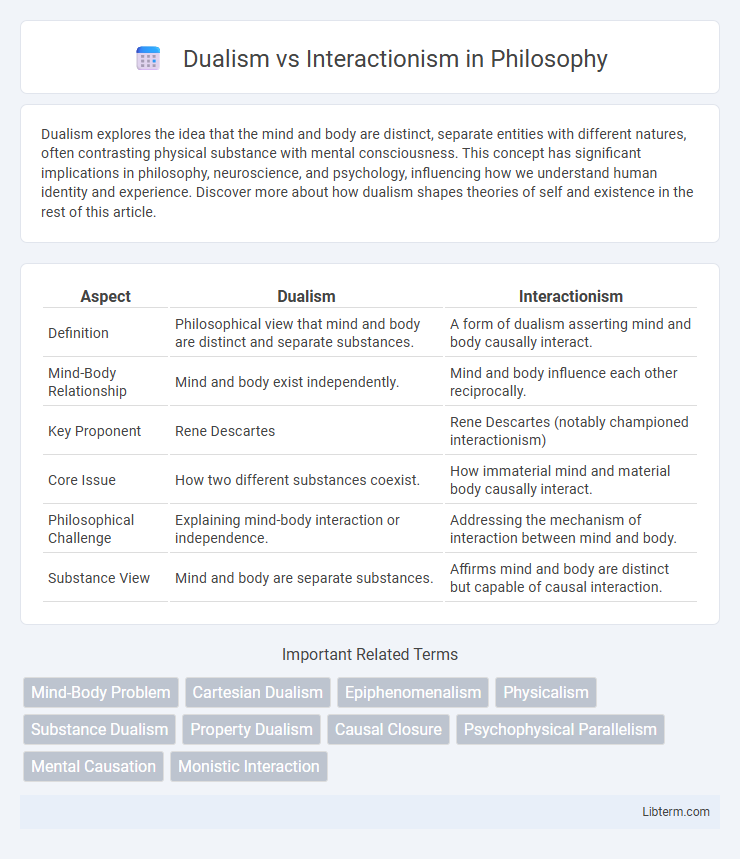Dualism explores the idea that the mind and body are distinct, separate entities with different natures, often contrasting physical substance with mental consciousness. This concept has significant implications in philosophy, neuroscience, and psychology, influencing how we understand human identity and experience. Discover more about how dualism shapes theories of self and existence in the rest of this article.
Table of Comparison
| Aspect | Dualism | Interactionism |
|---|---|---|
| Definition | Philosophical view that mind and body are distinct and separate substances. | A form of dualism asserting mind and body causally interact. |
| Mind-Body Relationship | Mind and body exist independently. | Mind and body influence each other reciprocally. |
| Key Proponent | Rene Descartes | Rene Descartes (notably championed interactionism) |
| Core Issue | How two different substances coexist. | How immaterial mind and material body causally interact. |
| Philosophical Challenge | Explaining mind-body interaction or independence. | Addressing the mechanism of interaction between mind and body. |
| Substance View | Mind and body are separate substances. | Affirms mind and body are distinct but capable of causal interaction. |
Introduction to Dualism and Interactionism
Dualism posits that the mind and body are distinct substances, with the mind being non-physical and the body physically material. Interactionism, a subtype of dualism, asserts that these two substances causally influence each other, allowing mental states to affect physical processes and vice versa. This framework contrasts with strict physicalism by maintaining that mental phenomena cannot be fully explained by physical interactions alone.
Historical Origins of Dualism
Dualism, with roots tracing back to ancient Greek philosophy, was prominently articulated by Plato and later refined by Rene Descartes in the 17th century, who posited a clear distinction between mind and body as two fundamentally different substances. This metaphysical stance laid the groundwork for interactionism, which contends that these distinct substances causally interact, influencing each other despite their ontological differences. Understanding the historical origins of dualism is crucial for contextualizing ongoing debates in philosophy of mind and cognitive science regarding consciousness and mental causation.
Philosophical Foundations of Interactionism
Interactionism's philosophical foundations root in the belief that mind and body are distinct entities that causally interact, opposing strict dualism's separation. This perspective draws from Cartesian dualism but challenges its epiphenomenal stance by emphasizing bidirectional influences between mental states and physical processes. Philosophers like Descartes and later thinkers such as Karl Popper and John Eccles contribute to a framework where consciousness and neurological functions dynamically intertwine.
Key Differences Between Dualism and Interactionism
Dualism posits that mind and body are fundamentally distinct substances, whereas interactionism asserts that mind and body, while separate, causally influence each other. Dualism emphasizes ontological separation, while interactionism highlights the dynamic, reciprocal interaction between mental states and physical processes. The key difference lies in interactionism's acceptance that mental events can cause physical events and vice versa, contrasting with dualism's strict division without specifying interaction mechanisms.
Major Proponents and Influential Theorists
Rene Descartes is a primary proponent of dualism, positing a clear distinction between mind and body as separate substances. In contrast, interactionism, which emphasizes causal interaction between mind and body, is advocated by contemporary philosophers like Karl Popper and John Eccles. Both perspectives have significantly shaped debates in philosophy of mind, cognitive science, and neuroscience.
Mind-Body Relationship in Dualism
Dualism posits that the mind and body are distinct substances, where the mind is non-physical and the body is physical, emphasizing a clear separation in the nature of consciousness and matter. Interactionism, a subset of Dualism, argues that the mind and body causally influence each other, allowing mental states to affect physical processes and vice versa. This framework addresses the mind-body relationship by proposing that despite their different natures, the mind and body engage in two-way interaction, often illustrated by examples like decision-making impacting bodily actions.
Mind-Body Interaction in Interactionism
Interactionism posits a bidirectional causal relationship between mind and body, where mental states can influence physical processes and vice versa, contrasting with strict dualism that separates mind and matter without interaction. This perspective emphasizes the mind's capacity to affect neural activity and bodily functions, supporting empirical findings in psychoneuroimmunology and neuroplasticity. The challenge of explaining the mechanism of mind-body causation remains central in philosophical debates and cognitive neuroscience research.
Scientific Perspectives and Criticisms
Dualism posits that mind and body are fundamentally distinct substances, but scientific perspectives challenge this by emphasizing neurobiological evidence showing mental processes arise from brain activity. Interactionism attempts to bridge this gap by proposing bidirectional causality between mind and body, yet it faces criticism due to the lack of empirical mechanisms explaining how immaterial mind states influence physical brain states. Neuroscientific research increasingly favors monistic models, such as physicalism, which align more coherently with observed data on brain function and consciousness.
Contemporary Relevance and Applications
Dualism and interactionism remain central in contemporary philosophical debates on the mind-body problem, influencing cognitive science, psychology, and artificial intelligence research. Interactionism, which posits causal interaction between mind and body, underpins therapeutic practices such as psychosomatic medicine and influences models of brain-mind integration in neuroscience. Dualism's emphasis on non-physical mental states continues to shape discussions on consciousness, personal identity, and ethical considerations in neuroethics.
Conclusion: Future Directions in Mind-Body Philosophy
Emerging research in neuroscience and artificial intelligence increasingly challenges traditional dualism by providing evidence for complex brain-mind interactions, supporting interactionist perspectives. Future directions in mind-body philosophy emphasize integrating empirical findings with refined metaphysical frameworks to better explain consciousness and mental causation. Advancements in neurophenomenology and computational modeling hold promise for resolving longstanding debates surrounding the mind-body problem.
Dualism Infographic

 libterm.com
libterm.com